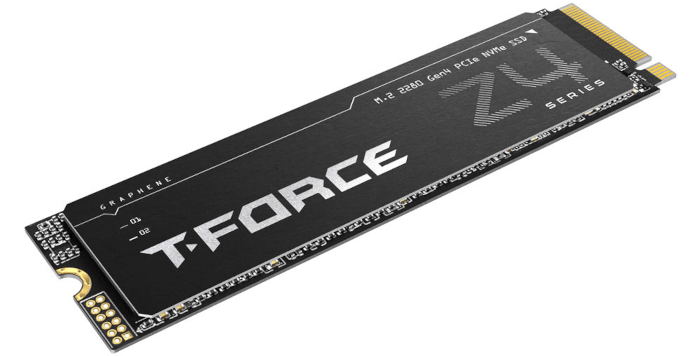TEAMGROUP are an emerging brand in the consumer SSD market. They provided a review sample on the Z44A7 for review and testing. The Z44A7 is available in 512GB, 1TB, 2TB, and 4TB sizes. All of the Z44A7 SSDs are backed by a five year warranty and the 2TB drive we tested is rated for 1500TBW endurance. The drive has a maximum read speed of 7,400 MB/s, and sequential write of 7,000 MB/s.
The Z44A7 uses the same controller and flash combination as is found on the Lexar NM790 and Addlink A93. This combination offers good performance and excellent power efficiency in testing. The controller is a 4-channel, 12nm design that can push the limits of PCIe 4.0 with its 2400 MT/s bus.
The dense TLC means there’s a single-sided design. It’s less than 1mm thick which means it’ll be ideal for laptop users (remember that some laptops can only take a single-sided SSD), but it’s also a great option for desktops (particularly with the 4TB model).

The SSD uses a graphene heatsink which enhances heat dissipation performance and enables better system operating stability. We put the SSD under extreme workloads, hammering it with sequential writes for more than 30 minutes and had no issues with stability on both a desktop machine and an Intel NUC.
The drive offers built-in smart algorithm management mechanism includes functions such as GC (garbage collection), TRIM command, LDPC (Low Density Parity Check Code) error correction mechanism, E2E data protection, and so on.
Here are the specification of the 2TB SSD.
Specifications
| Z44A7 M.2 NVMe SSD | |
|---|---|
| Brand | TEAMGROUP |
| Model: | Z44A7 |
| Form Factor: | M.2 2280 |
| Capacity: | 2TB (512GB, 1TB and 4TB capacities are also available) |
| Controller | MaxioTech MAP1602 |
| Storage Memory: | YMTC X3 |
| DRAM Cache: | No |
| Endurance | 1500 TBW (2TB) model |
| MTBF: | 1,700,000 Hours |
| Interface | PCIe Gen 4 x4, NVMe 1.4 |
| Warranty: | 5 years |
| Price: | £104.99 |
Next page: Page 2 – Benchmarks
Pages in this article:
Page 1 – Introduction and Installation
Page 2 – Benchmarks
Page 3 – Summary

1500TBW isn’t very good.
If you move 100GB a week you can do that for about 3,000 weeks or 57.5 years.